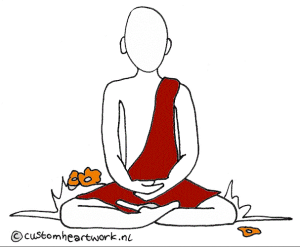Going on Retreat
Since many centuries people have been going on retreat. Great teachers like Jesus, Mohammed and Buddha did so, but also today many people feel the need to withdraw for a while from their everyday concerns. When attending a retreat we might be motivated by various factors. Some people come because they are exhausted, or want to cope with a great loss. Others want to learn to deal with persistent gloominess or with chronic pain; or they just want some rest. Others might not experience any specific difficulties but are looking for deeper meaning and wisdom in the midst of the chaos of everyday life. All these motivating factors have one basic truth in common: in one way or another we experience the imperfection and unsatisfactoriness of existence, and this causes us to look for inner spaciousness and freedom. A meditation retreat is a wonderful opportunity to do this, as if offers a conducive environment for developing insight into ourselves, and inner freedom.
Mindfulness
In a vipassana or mindfulness retreat the emphasis is on developing mindfulness. It is an intensive training: cultivating the capacity for awareness and acknowledging in a non-judgemental way what is happening in and around us in the present moment. We take a break, as it were, from everyday life, where the emphasis is more on doing and achieving; we develop the art of being with what is. To help this capacity for being present to flourish, usually some practical training guidelines are put in place.
Silence
Participants in a retreat are asked to be in silence as much as possible, and only to communicate when it is necessary. In the beginning meditators experience being together in silence as challenging and they need to get used to it, whereas at the end of a retreat most people say that they relished the silence. It seems that communicating takes an enormous amount of energy, more than we are usually aware of. By being in silence can we experience what the Buddha called kaya-viveka: a calm oasis by way of bodily and verbal seclusion. It is also recommended not to make telephone calls or send text messages. As much as possible let go of all work-related activities and responsibilities during a retreat, and delegate your duties where possible. When confirming a booking for a retreat, we always give a contact number that can be called in case of emergencies at home or at work.
Retreatants are usually also advised not to read or write. Not because it is wrong, but primarily because we easily lose the connection with ourselves in such activities. Besides, we tend to start writing about something that happened previously, and so we lose the presence of mind that we are actually training in a retreat.
Daily programme
We meditate according to a certain basic framework and participants are invited to follow a meditation schedule. Meditation teachers have their own way of drawing up a schedule. In Burmese meditation centres where insight meditation is practised according to the tradition of the Venerable Mahasi Sayadaw (a Buddhist monk from Myanmar who died at the end of the last century), the programme runs from early morning until late at night. It is a very basic schedule where meditators are invited to live as simply as possible, so that they can follow a daily routine that is conducive to developing mindfulness. Walking and sitting meditation are alternated, and the other activities like eating, showering and going to the bathroom, are carried out slowly and in silence. We are invited to develop as much continuity as possible in being mindful, from the time we wake up until the time we go to sleep. Continuous mindfulness helps to nourish the meditative powers so that they become wholesome forces that lead to insight and purity of mind.
When we teach retreats in the West, the schedule is usually a bit lighter than in Southeast Asia, because Iwefeel that people in the West need quite some time to become balanced in their meditation practice. People who come on retreat are often extremely tired at the beginning, and in most retreats there are one or more participants with a physical difficulty. Therefore we often start a retreat with the following schedule:
Retreat Schedule
6.00 am: wake up
6.30 am: sitting meditation
7.00 am: mindful movement
7.30 am: breakfast
8.00 am: informal meditation and/or working meditation
8.45 am: walking meditation
9.30 am: sitting meditation (with guidance)
10.15 am: walking meditation (with tea/coffee)
11.15 am: sitting meditation
12.00 pm: walking meditation
12.30 pm: sitting meditation
1.00 pm: lunch
1.45 pm: informal meditation
2.45 pm: walking meditation
3.30 pm: sitting meditation
4.15 pm: walking meditation
5.00 pm: sitting meditation
5.45 pm: evening meal
6.30 pm: informal meditation
7.00 pm: walking meditation
7.45 pm: talk on meditation
8.30 pm: walking meditation
9.00 pm: sitting meditation (with kindness meditation)
9.30 pm: informal meditation and rest
Informal meditation means: walking, sitting or lying down meditation, doing prostration exercises, yoga, going for walk, taking a shower or a nap, doing tai chi or chores…, all of these with mindfulness and in silence! After a few days – when the participants are a bit more rested – I often start a bit earlier in the morning, and sometimes I shorten the periods of informal meditation, as an encouragement to get more continuity of mindfulness.
Guided meditations and exchanges
During retreats I often use themes from Buddhist psychology in the guided meditations in the morning and the evening. These guided sittings are used as a support for the meditators. There is also the opportunity for participants to have individual exchanges with me about their meditation experiences. This happens once a day, or every other day for more experienced practitioners. In this exchange, in Asia often called ‘interview’, the meditator reports to the meditation teacher, and is invited to give a short description of what they have experienced in the silence of the previous period. One is asked to relate in an objective way, almost like a laboratory technician, about experiences during the sitting meditation, but also during the walking meditation and the other activities during the day. These experiences concern the movements of the breath, physical sensations that were clearly there, thoughts, mental states or moods, and sensory impressions.
The exchanges between meditator and teacher are extremely beneficial and offer the opportunity for enhanced awareness and for continuous growth in mindfulness. A lot more could be said about going on retreat. In the near future we shall publish a book on this topic. It is very difficult to describe the taste of a mango fruit if one has never tasted it. But article can give at least a general impression of what to expect when you register for a retreat.
Feedback
The feedback below from participants shows that meditators experience a retreat as not easy, but yet as extremely insightful and enriching.
‘It is amazing what happens in the silence between me and the other participants. I became aware of judging, criticising, projecting, analysing and many other similar tendencies, tendencies I was never so aware of before. Although these will also be there in daily life, except that I usually don’t notice them! I learn so much from this silence. But everything is allowed to be there, I only need to note them, and I feel free. What somebody else notices in me he or she can use that as their meditation object. Fantastic, the space and freedom this offers.’
‘Believe it or not, I have become kinder to myself … Because I allow myself more, I relax more, and therefore I react in a more relaxed way, and so I am approached in a more relaxed way, so there is less reason to become irritated, angry, make mistakes, etc. In this way everything slowly becomes softer, more pleasant.’
‘In the silence I could fee a great sense of connection … It touched me deeply and has made a lasting impression.’



